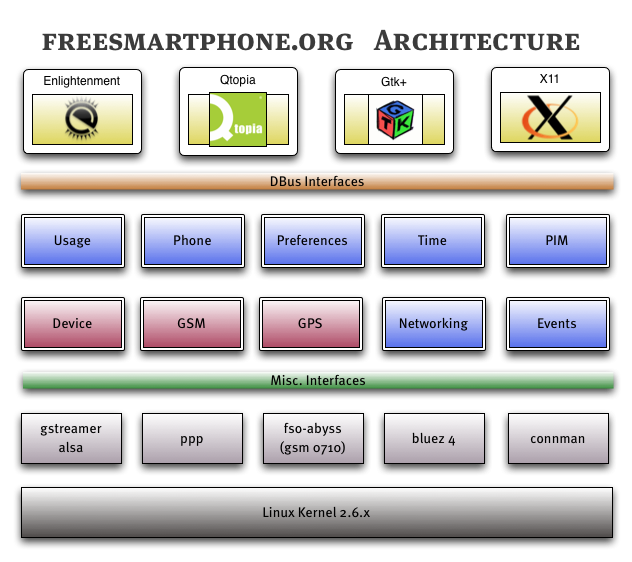OpenmokoFramework/ru
From Openmoko
(→Known API Consumers) |
(→Tools) |
||
| Line 85: | Line 85: | ||
* [[Paroli]] | * [[Paroli]] | ||
| − | == | + | ==Инструменты== |
* [[OpenmokoFramework/mdbus|mdbus]] -- a dbus introspection and interaction utility, | * [[OpenmokoFramework/mdbus|mdbus]] -- a dbus introspection and interaction utility, | ||
| − | * [[OpenmokoFramework/cli|cli-framework]] -- | + | * [[OpenmokoFramework/cli|cli-framework]] -- командная оболочка dbus на python. |
| − | * [[OpenmokoFramework/mickeyterm|mickeyterm]] -- | + | * [[OpenmokoFramework/mickeyterm|mickeyterm]] -- MUXer-aware эмулятор консоли. |
| + | |||
==Scripts== | ==Scripts== | ||
* Example [[OpenmokoFramework/scripts|Scripts]] that work over dbus | * Example [[OpenmokoFramework/scripts|Scripts]] that work over dbus | ||
Revision as of 07:01, 24 June 2009
| Languages: |
English • العربية • Български • Česky • Dansk • Deutsch • Esperanto • Eesti • Español • فارسی • Suomi • Français • עברית • Magyar • Italiano • 한국어 • Nederlands • Norsk (bokmål) • Polski • Português • Română • Русский • Svenska • Slovenčina • Українська • 中文(中国大陆) • 中文(台灣) • Euskara • Català |
| Key pages on: FSO |
|
|
|---|
Openmoko базируется на программной прослойке freesmartphone.org (FSO). Дистрибутив Om 2009 будет базироваться на FSO. Подробности смотрте на http://www.freesmartphone.org, http://docs.freesmartphone.org, и http://trac.freesmartphone.org. Openmoko is working on a stable system services back-end. Focus is on stable highlevel services that you can access from whatever language or UI that supports dbus. FSO is all about middleware, but if one stacks a bootloader+kernel under it and telephony applications on top, one gets a functional distribution. These are made available as FSO-image milestones.
Q/A
- Вопрос: FSO используется только в Openmoko?
- Ответ: Нет. FSO будет доступен для всех устройств на базе Linux.
- Вопрос: FSO встроен в текущие образы OpenMoko?
- Ответ: Да. Он доступен в SHR и Openmoko 2009.x тестовых образах.
- Вопрос: Какой статус разработки?
- Ответ: См. ниже или на http://trac.freesmartphone.org .
- Вопрос: Как работать с Zhone (демо-приложение FSO)?
- Ответ: FSO UI Tutorial
- Вопрос: Как проще всего собрать FSO?
- Ответ: Смотрите Building_FSO. Инструкции сейчас на http://downloads.freesmartphone.org.
Фазы разработки
- Фаза I - создание рабочего API.
- Фаза II - увеличение скорости работы API.
События (Фаза I)
- 2009-07-01: milestone 6
- 2009-03-31: milestone 5.5
- 2009-02-02: milestone 5 achieved
- 2008-11-11: milestone 4 achieved
- 2008-09-10: milestone 3 achieved
- 2008-07-01: milestone 2 achieved
- 2008-06-01: milestone 1 achieved
События (Фаза II)
... to be defined ...
Цели
- Создать архитектру для создания мощных и функциональных приложений.
- Поддержка конкуренции между различными UI для их развития.
- Поддержка пользователей фреймворка (н.р. разработчики) для его развития.
Requirements
- Make it simple
- Concentrate on core services
- Be programming language agnostic
- Be UI toolkit agnostic
- Try to reuse existing technologies as much as possible, but not at the cost of a bad API
How to achieve that technically
- Choose D-Bus as the collaboration line. Below dbus, we can work together. Above dbus, we can differentiate
- Expose features through dbus APIs implemented by UI-agnostic and language-agnostic services (daemons)
- Optimize for Openmoko devices, but support multiple architectures and purposes through plugin interfaces and suitable hardware abstraction mechanisms
- By not being afraid of reinventing the wheel for a wheelbarrow if all the existing wheels are made for sports cars
Mandatory Reading
- Frameworks exist for conceptual integrity
- Ten ways to make more humane open source software
- FreeSmartPhone.org Wiki
What this is NOT about
This initiative does not cover low level services such as
- Bootloader, Kernel, or System Init.
This initiative does not cover high level services such as
- X-Window-System, Window Manager, UI Toolkits,
- Application Launchers, Applications, or Fancy UIs.
Architectural Overview
Software Components
Please see the description at http://www.freesmartphone.org/index.php/Architecture
Проекты, использующие FSO
Инструменты
- mdbus -- a dbus introspection and interaction utility,
- cli-framework -- командная оболочка dbus на python.
- mickeyterm -- MUXer-aware эмулятор консоли.
Scripts
- Example Scripts that work over dbus
How to debug
- log in via ssh
- killall python
- edit /etc/frameworkd.conf and add to the frameworkd section:
- log_level = DEBUG
- log_to = file
- log_destination = /somewhere/where/you/have/space (preferably SD or NFS, etc.)
- Read our documented frameworkd.conf configuration file to learn about the other options.
- relaunch frameworkd (/etc/init.d/frameworkd stop; /etc/init.d/frameworkd start)
- log in via ssh (yes, again)
- export DISPLAY=:0.0
- run your favourite client (zhone, cli-framework, ...)
Attach the logs to the tickets, please.
The role of Python
Where we write new code, we will use Python to implement the dbus services. The reason for that being the rapid prototyping nature of Python and the emphasis on the D-Bus APIs. Using Python, the turnaround times to experiment with APIs are incredibly faster than for using a compiled language such as C or C++.
Once the APIs have been used by application programmers, we can start profiling and possibly reimplement some of the services with daemons written in Vala, if necessary. We might as well succeed in improving performance by using Pyrex/Cython/Ctypes to keep the benefits of Python.
Team & Roadmap
Team
- Michael 'Mickey' Lauer (team leader) -- Openmoko freelancer, working in Frankfurt/Main, Germany.
- Jan 'Shoragan' Luebbe -- Openmoko student, working part-time in Brunswick, Germany.
- Daniel 'Alphaone' Willmann -- Openmoko student, working part-time in Brunswick, Germany.
- Stefan Schmidt -- Openmoko student, working part-time in Brunswick, Germany.
Roadmap
The milestone releases are combined Openmoko Framework and Zhone releases. Remember: A feature that isn't visible, working, and tested in our framework testing application (Zhone) does not exist. Until Framework 1.0.0 (early 2009), we will not use any versioning in components. Afterwards, individual components may see individual releases.
Note: The milestones and tasks moved over to our issue tracker.
Download and see also
- Development tracker
- freesmartphone.org
- fso-testing and fso-unstable images and feeds (maintained by Rod Whitby, MokoMakefile author)

